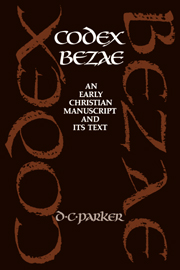Book contents
- Front Matter
- Contents
- List of illustrations
- Preface
- Abbreviations and textual conventions
- Introduction
- PART I The palaeography
- PART II The scribe and the tradition
- PART III The correctors
- PART IV The bilingual tradition
- Chapter Twelve The codex and the critics
- Chapter Thirteen A comparison of the columns
- Chapter Fourteen The character of the tradition
- Part V Text and codex
- Appendices
- Plates
- Notes on the plates
- Indexes
Chapter Thirteen - A comparison of the columns
Published online by Cambridge University Press: 09 November 2009
- Front Matter
- Contents
- List of illustrations
- Preface
- Abbreviations and textual conventions
- Introduction
- PART I The palaeography
- PART II The scribe and the tradition
- PART III The correctors
- PART IV The bilingual tradition
- Chapter Twelve The codex and the critics
- Chapter Thirteen A comparison of the columns
- Chapter Fourteen The character of the tradition
- Part V Text and codex
- Appendices
- Plates
- Notes on the plates
- Indexes
Summary
It has been known for many years that the two columns of Codex Bezae agree less closely with each other in some books than in others. This was first noted by J. A. Findlay.
He found 107 differences in reading between the columns in Matthew, 106 in John, 176 in Luke, 469 in Mark, and 607 in Acts: 1,465 in all. According to my examination, the numbers of differences are
Matthew 76
John 87
Luke 150
Mark 226
Acts 317
Total 856
Findlay argued that these figures reveal a revision that became increasingly less thorough. But, although this is true of the overall figures, a closer examination brings out a rather more complicated development. Table 37 shows the number of differences between the columns, chapter by chapter. It reveals that particular chapters contain high numbers of differences. The table is helpful because we have some idea of the passages involved, and there is some kind of division according to subject matter. But the chapters are of very unequal lengths, and not all are complete. Table 38 takes the codex by units often double-page openings where both columns are extant.
Were only a decreasing care of revision the cause of the figures revealed by the table, we might be entitled to expect a more constant increase in the number of discrepancies through each book. There is indeed a marked upturn at the very end of Luke and Mark (we do not have the last part of Acts).
- Type
- Chapter
- Information
- Codex BezaeAn Early Christian Manuscript and its Text, pp. 194 - 249Publisher: Cambridge University PressPrint publication year: 1992



